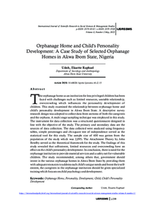The orphanage home as an institution for less privileged children has been faced with challenges such as limited resources, unstable relationship, overcrowding, all of which influence the personality development of children. This study examined the relationship between orphanages and child's personality development in Akwa Ibom State, Nigeria. A descriptive survey research design was adopted to collect data from sections of both the caregivers and the orphans. A multi stage sampling technique was employed in this study. The instrument for data collection was a structured questionnaire designed in line with the objective of the study. The primary and secondary data are the sources of data collection. The data collected were analyzed using frequency tables, simple percentages and chi-square test of independence served as the statistical tool for this study. The sample size of 400 was gotten from the population of the study which was 2,095. The Attachment Theory by John Bowlby served as the theoretical framework for the study. The findings of this study revealed that self-esteem, limited resources and overcrowding have an effect on the child's personality development. In conclusion, there is need for the orphanage institution to provide essential services and a safety net for vulnerable children. The study recommended, among others that, government should invest in the various orphanage homes in Akwa Ibom State by providing them with adequate resources to address each child's unique needs and boost their selfesteem, the caregivers in the orphanage institution should be given specialized training which focuses on child psychology and development.

